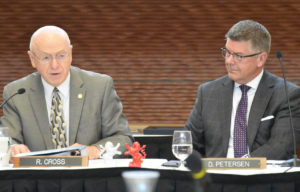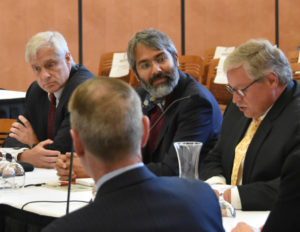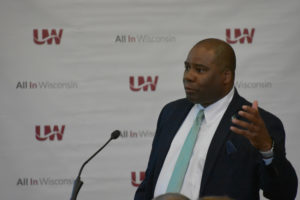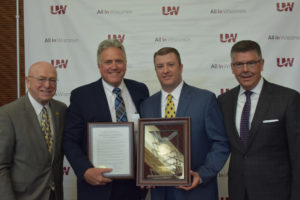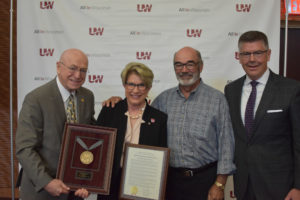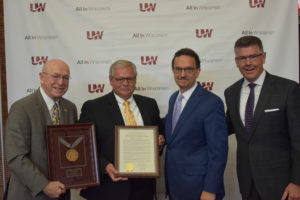MADISON, Wis. – Andrew (Drew) S. Petersen, the new President of the University of Wisconsin System Board of Regents, announced Friday the launch of an aggressive, statewide campaign to spotlight and showcase the value for students, families and taxpayers that is provided by every institution of the University of Wisconsin System.
“Starting in September, we will combine forces, starting with my fellow Regents, System leadership, Chancellors, business and community leaders, campus community members, legislators, and, of course, students to mobilize our All In Wisconsin initiative,” Petersen said.
“We want to more broadly share the benefits and value our campuses offer their regions and the state. We want to listen and learn more about what we can better do to serve the people of Wisconsin. And we want to mobilize and unleash citizens’ passion for this great University system.”
Petersen reiterated that the UW System is Wisconsin’s economic driver, and the best investment taxpayers can make.
“We are returning 23 dollars for every dollar invested in us,” Petersen said. “We are graduating a record number of students, over 36,000 for each of the last six years, the majority of whom build careers, raise families, and settle here. We are producing groundbreaking research that leads to the creation of companies and family sustaining jobs.
“I want us to harness the power of the System – of our graduates, our faculty, and staff – to grow the Wisconsin economy and to make our state the envy of the Midwest,” Petersen said.
President Cross updates Board on biennial budget
UW System President Ray Cross provided a brief update on the biennial budget process. He noted the capital portion of UW System’s request remained almost entirely intact, providing over $1.2 billion in critical and long overdue capital investment. He thanked Governor Evers as well as Representatives John Nygren and Mark Born and Senator Alberta Darling for their support.
Cross said another positive development in the budget is the inclusion of a 2% compensation increase in each year of the biennium. “This investment in our faculty and staff is crucial to our ability to recruit and retain the best and brightest,” he said. “I look forward to continuing to press that issue in the next budget.”
On the operational side, Cross said the UW System will work closely with Regents in developing a plan to bring before Joint Finance and the Administration to invest the $45 million made available through the Joint Finance supplemental account.
“We remain concerned that the funding provided will not allow us to make the investments necessary to maintain and expand the quality educational experience our students and our state expects and needs,” Cross said. He reiterated that preserving the quality of education as tuition remains frozen for the seventh and eighth year at UW’s four-year institutions and 11th and 12th year at the two-year institutions, will require operational investments. “This will continue to be a priority,” Cross said.
Early Brain Development and Its Impact of the Economy
A key feature of a thriving economy is a skilled, well-educated workforce. Research shows investments in early childhood development and education are a critical first step in workforce development and building a strong Wisconsin economy.
“Early childhood development builds the foundation for success for our future students. Research clearly shows this is the solution to solving achievement gaps,” said Regent Emeritus S. Mark Tyler, chair of the Governor’s Council on Workforce Investment and a member of the Governor’s Early Childhood Advisory Council
Dr. Dipesh Navsaria, Department of Pediatrics, UW-Madison’s School of Medicine & Public Health, talked about the various factors that influence brain development of very young children, and the significant long-term impacts of early life experiences.
“Relationships with parents, with caregivers, in children before age 3 is critical in brain development. Despite what you may hear, there is no app that can replace this,” Navsaria said.
Dennis Winters, Wisconsin’s chief economist and director of the Bureau of Workforce Information & Technical Supports at the Wisconsin Department of Workforce Development, highlighted the close connections between early childhood success and overall education and career success, noting the benefits accrue both individually and societally.
President’s Report
As part of President Cross’s report to the Board and his News from Around the UW System video, Regents learned that UW-Eau Claire students have launched Clearwater Labs, a 100% student-run software consulting company in downtown Eau Claire that’s on track to become self-funded and self-sustaining. The students work as a team providing technology solutions to area businesses. One project, an energy dashboard, advanced to the third round of the Smart Cities–Smart Futures competition, earning a $1,500 prize.
- See the full July 2019 “News Around the UW System” video
For his Faculty Spotlight, President Cross welcomed Dr. Nicholas Bakken, an associate professor in the Department of Sociology and Criminal Justice at UW-La Crosse.
Bakken told the Regents that, as part of the research process, his students have the opportunity to meet and interview men and women who are incarcerated. “It provides an applied experience for students that they may not get otherwise while also illustrating some of the current social problems that exist not only within the La Crosse community but also in Wisconsin and nationally,” he said. Bakken also noted that it helps students “to realize that behind social problems are actual people.”
UW-Green Bay presents annual athletics report
Presenting UW-Green Bay’s NCAA Division 1 annual athletics report, Athletic Director Charles Guthrie told Regents that the overall GPA for the department in 2017-18, the most recent year data is available, was 3.39 – the highest GPA for student athletes in UW-Green Bay athletics’ history. The Graduation Success Rate (percentage of first-year, full-time freshmen who graduate within six years) for UWGB student athletes was 70%, compared to 51% for the general student body.
Farewell to Colleagues
The Regents recognized the service, commitment and contributions of several colleagues.
UW-Stout Chancellor Bob Meyer will retire in August after serving the university for 32 years, including the past five years as UW-Stout’s seventh chancellor.
Meyer noted that the current fiscal trajectory is not sustainable, and he believes more work must be done with elected officials in communicating the value of a diploma from all UW System institutions and that investing is the university is a wise use of tax dollars.
“Nothing is more satisfying than having worked with dedicated faculty and staff across the System transforming the lives of students,” Meyer said. “I will always be Stout proud.”
Regent Emeritus Regina Millner served on the Board from 2012-2019, including time as President and Vice President.
She encouraged board members to continue their vigilance on issues like holding down student debt and the changing demands on higher education.
“What hasn’t changed is how the university provides students with the skill, knowledge and competencies for their first job and the unknown jobs of the future,” Millner said. “What is changing are the older returning students who have the same needs. Higher ed has never been more important to both groups and the economy as a whole.”
She added that higher education is often characterized as an ivory tower but “Ours is engaged, involved and committed to its students and state as a whole. It’s been my privilege to serve on this board.”
Regent Emeritus Mark Tyler served on the UW System Board for two stints as the representative of the Wisconsin Technical College System (2011-13, 2015-19).
Tyler said he appreciated the opportunities he’d had over the years to get to know faculty, to see research that promised to change lives for the better, and to see students discover their passion. His fondest memory will be participating in commencement as students received their degrees, he said.
He encouraged Regents to continue working on making movement between the WTCS and UW System easier for students. He also noted that he’s particularly proud of helping to expand engineering programs in northwestern Wisconsin. “This is going to be extremely impactful for students and businesses,” he said.
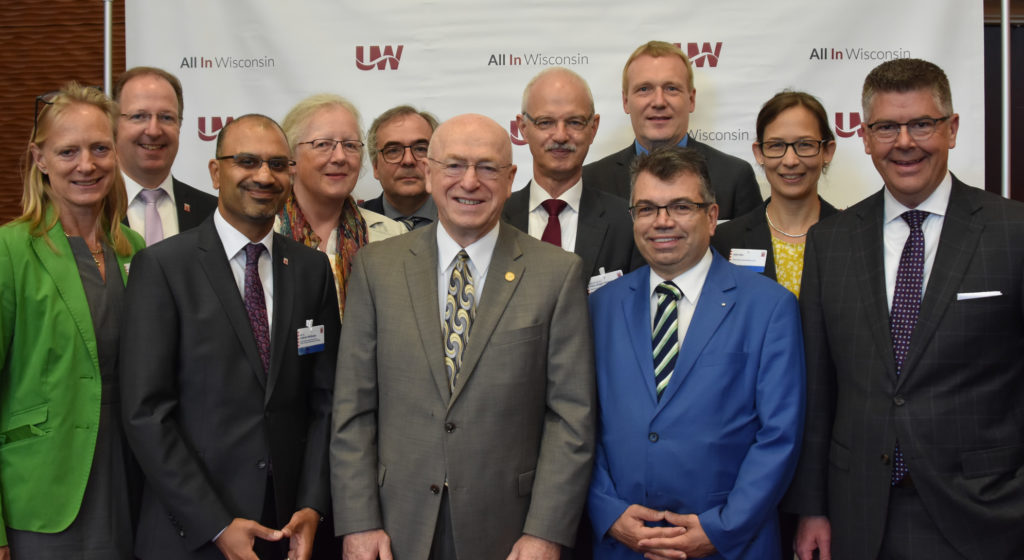
President Cross, front center, and Regent President Petersen, far right, welcome a visiting delegation from the State of Hessen, Germany
In other business, the Board of Regents:
- Welcomed a visiting delegation from Hessen, Germany;
- Approved a public notice for a preliminary hearing on revisions to Administrative Code Scope Statement for Chapter UWS 17. In October 2017, the Board adopted Regent Policy Document 4-21, Commitment to Academic Freedom and Freedom of Expression. The policy includes provisions for mandatory sanctions for students found responsible for multiple violations of the policy. To fully effectuate the policy, the Board must pursue changes to Chapter UWS 17;
- Approved UW-Eau Claire’s request for a Bachelor of Science in Biomedical Engineering;
- Approved UW-Eau Claire’s request for a Bachelor of Arts and Bachelor of Science in Public Health;
- Approved UW-Green Bay’s request for a Master of Science in Sport, Exercise, and Performance Psychology;
- Approved UW-Madison’s request for a Master of Science in Design Plus Innovation (Design + Innovation);
- Approved UW-Platteville’s request for a Master of Science in Strategic Management;
- Approved UW-River Fall’s request for a Bachelor of Science in Biomedical and Health Science;
- Approved UW-River Fall’s request for a Master of Science in Strength and Conditioning;
- Approved UW-Whitewater’s request for a Master of Science in Education in Higher Education Leadership;
- Approved the Policies and Procedures Relating to Faculty Layoff and Termination for UW-La Crosse and UW-Platteville;
- Approved UW-Milwaukee’s Sponsored Research Agreement with Wisconsin Electric Power Company;
- Approved UW-Milwaukee’s Contractual Agreement with Rockwell Automation Inc.;
- Approved UW-Madison’s Contractual Agreements with Viewpoint Therapeutics;
- Approved UW-Madison’s Contractual Agreement with Foundation for Food and Agriculture Research, Inari Agriculture Inc., KWS SAAT SE, and Syngenta Crop Protection, LLC;
- Approved UW-Madison’s request for authority to execute the remainder of the design contract and construct the UW-managed Red Gym Renovation project;
- Approved UW-Madison’s request to enter into a lease of space for the Division of Information Technology that will provide office space for a unit of DoIT that does not need to be physically located on-campus. The move would create critical office space for new Computer Sciences staff who are expected to start work next fall;
- Approved UW System’s request to construct two 2017-19 Classroom Renovation/Instructional Technology Improvement Program projects for an estimated total cost of $1.7 million, one at UW-Oshkosh and one at UW-Stevens Point. The funding will be utilized to update existing general assignment classroom and laboratory instructional environments including associated furnishings and equipment to improve instructional technology;
- Approved UW System’s request for authority to construct four All Agency Maintenance and Repair projects at an estimated cost of $5.6 million. Projects include UW-River Falls’ University Center entry and terrace renovation; UW-Stout’s Price Commons kitchen hood replacement; and heating plant fuel reliability upgrades at both UW-La Crosse and UW-Oshkosh;
- Approved UW System’s request to rescind and remove Regent Policy Document 19-7, “Development of Facilities in the University of Wisconsin Colleges,” because the policy is obsolete due to the recent restructuring of UW System; and
- Approved UW-Oshkosh’s request for authority to rename its campuses: University of Wisconsin–Oshkosh, Fond du Lac campus; University of Wisconsin–Oshkosh, Fox Cities campus; and University of Wisconsin–Oshkosh, Oshkosh campus.
See more photos from the July 12, 2019, meeting.
The University of Wisconsin Board of Regents’ next meeting will be Oct. 10-11, 2019, hosted by UW-Superior.


